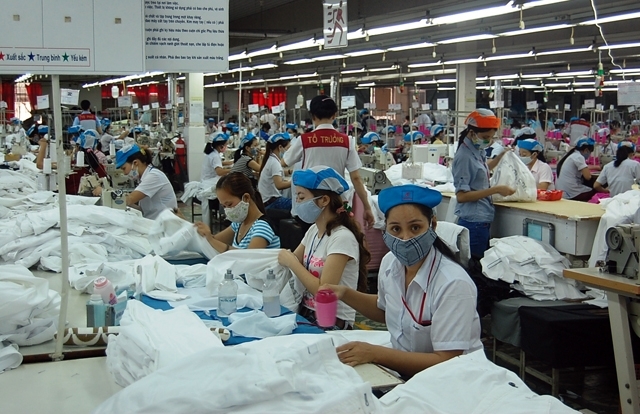 Economy
Economy

Many Vietnamese enterprises are keeping a close eye on the escalating US-China trade war and have expressed concern about its possible adverse impact on their business.

|
| A garment factory in Đồng Nai Province. Vietnamese enterprises are closely watching the escalating US-China trade war and fear possible impacts on their business. — VNA/VNS Photo |
HCM CITY — Many Vietnamese enterprises are keeping a close eye on the escalating US-China trade war and have expressed concern about its possible adverse impact on their business.
The US recently raised tariffs on US$200 billion worth of Chinese products to 25 per cent from 10 per cent and has started the process of slapping tariffs on another $300 billion worth of Chinese goods.
China has announced higher tariffs on thousands of US goods in retaliation.
Phạm Hải Long, general director of Argex Saigon Foodstuffs JSC, which exports processed foodstuff and seafood to the US and imports feedstock from China, told Người Lao Động (The Labourers) newspaper: “The depreciation of the Chinese yuan, the appreciation of the US dollar against currencies globally and the strong fluctuations in the USD/VNĐ exchange rate have all affected local exporters.
“[Vietnamese] export companies benefit from the depreciation of the đồng, but if the exchange rate goes up strongly, importers will have to pay high prices, affecting demand, and Vietnamese enterprises are also affected.”
Therefore, the important thing now is for the Government not to let it fluctuate too strongly, he said.
Phạm Ngọc Hưng, deputy chairman of the HCM City Union of Business Associations, said Việt Nam should benefit from the escalation in the trade war, including in terms of exports.
The trend of Chinese and other foreign firms switching their investments from China to other markets, including Việt Nam, would provide a fillip to many sectors in Việt Nam, he said.
The industrial and commercial property sectors are forecast to grow faster, there would be higher demand for labour and enterprises in supporting industries would get large manufacturers as customers, he said.
But the trick is in actually exploiting these advantages, and strengthen links between local enterprises and foreign investors to build brands for the former’s products and exports, he added.
In a media interview recently, Nguyễn Quốc Khanh, chairman of the Handicraft and Wood Industry Association of HCM City, said: “To avoid the impact of the trade war, many Chinese enterprises have shifted their investments to Việt Nam, helping boost the development of the woodworking sector.
“But the shift also poses challenges to Vietnamese firms since they will have to encounter fierce competition from the Chinese in many areas, from getting human resources and land to prices.
“Most local firms are still young and lack much experience. This requires Vietnamese firms to make more efforts in their business.”
The association plans to help local firms develop by help them with training human resources, promoting furniture brands in international markets and seeking customers, he said.
Asked if the increase in Việt Nam’s furniture exports to the US could attract higher tariffs, he said: “The US does not want to have a high trade deficit with any country. Our furniture exports to the US can increase further, but our import of machinery and timber from this market has also gone up.
“Currently Việt Nam is the second largest importer of US hardwood in Asia.”
Hưng and many companies raised the concern that Chinese manufacturers could ship half-finished products to Việt Nam for finishing and exporting to the US under Vietnamese labels.
Vietnamese companies should stay alert and not get involved with this, while authorised agencies should closely monitor such activities because if the US detects this, it might impose taxes, they said.
According to the Foreign Investment Agency, this year China has been the biggest foreign investor in Việt Nam, with US$1.3 billion in 187 projects and $116 million in existing ones. — VNS




